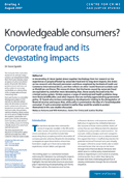The devastating consequences of corporate fraud on victims remain largely hidden and the lessons ignored, argues a report published by the Centre for Crime and Justice Studies.
Knowledgeable consumers? Corporate fraud and its devastating impacts by Dr Basia Spalek of the University of Birmingham, is based on interviews with victims of corporate fraud. It shows that the harms caused are equivalent to, and often more devastating than, those usually focused on by the criminal justice system. Victims express a range of emotional and health problems, long-term financial difficulties and other impacts that are not fully appreciated by government policy.
One victim of the BCCI scandal said, 'Street crime can involve you being physically assaulted but with white-collar crime you are physically and mentally assaulted.'
- Following analysis of interviews with the victims of the scandals relating to Robert Maxwell and the closure of the Bank of Credit and Commerce International (BCCI) the report concludes that:
- Victims of white-collar and corporate harms do not feature highly on victim policy agendas as they are not considered to be useful to the efficient running of the criminal justice system within the terms of current targets and objectives set by government.
- Financial abuses impact upon victims in multiple ways, producing emotional, psychological, behavioural, physical and financial reactions that can be severe and long-lasting.
- The harms caused by corporate fraud are equivalent to, and often more devastating than, those usually focused on by the criminal justice system.
- Economic liberalisation since the 1980s has created many 'sites of trust' that are open to crimes and abuses such as false accounting, fraud, conspiracy and the decimation of company pension schemes.
- There is little that employees and customers of deviant or unethical companies can do to avoid being victims of a wide range of abuses.
Dr Basia Spalek of the University of Birmingham University, said,
The idea that consumers and employees can protect themselves from corporate fraud is a chimera. Policy discussion should be focused on the long term impact of financial harm and the appropriate regulatory responses, rather than the constant obsession with the slackening of consumer rights and company responsibilities.
Richard Garside, Director of the Centre for Crime and Justice Studies, said,
If the real scale of cost and impact of white-collar crime on its victims was properly documented it would raise big questions about the willingness and ability of the state to protect the population from serious harms. As it is, a significant source of social injustice remains hidden and unaddressed by government.
